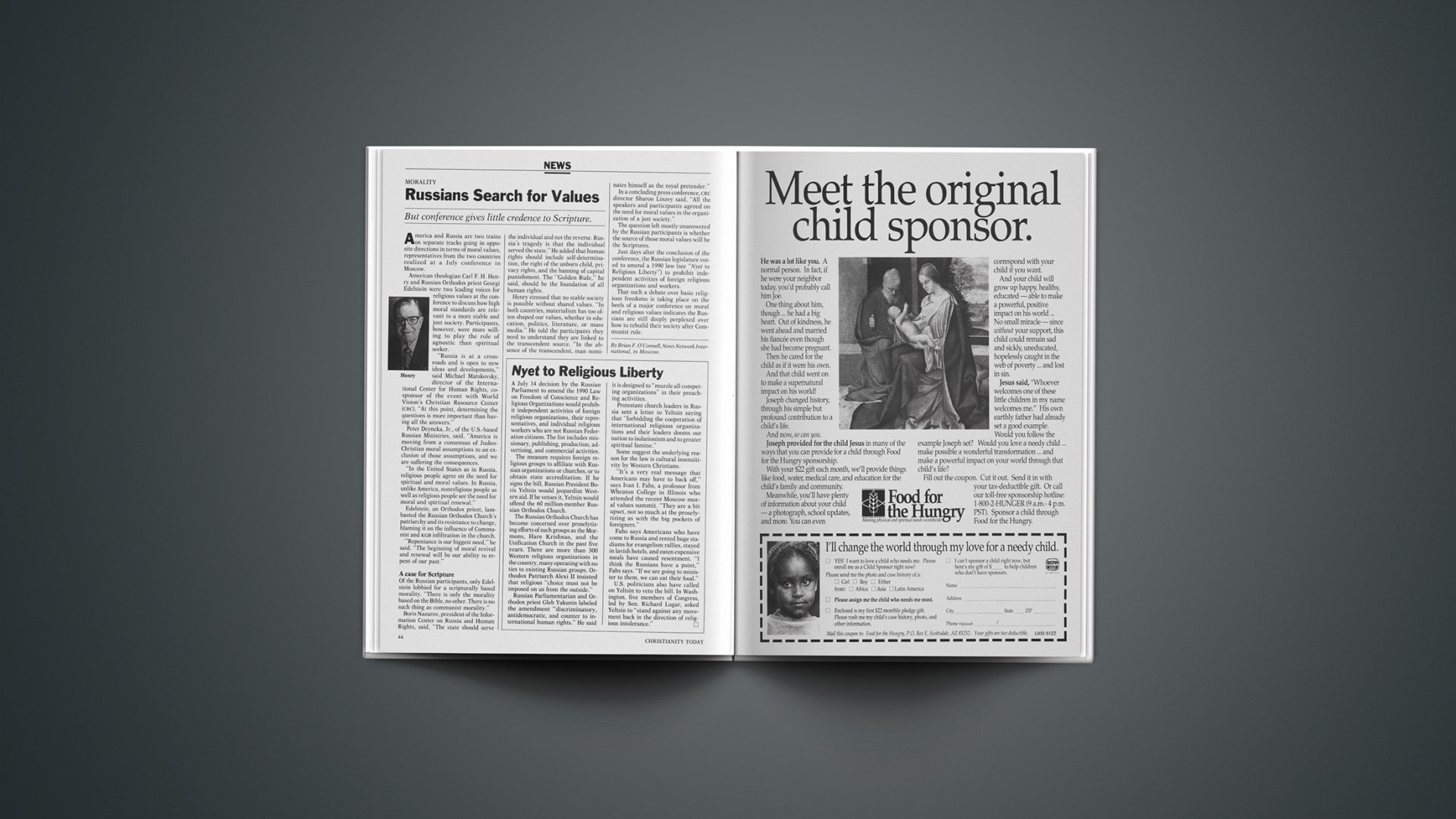But conference gives little credence to Scripture.
America and Russia are two trains on separate tracks going in opposite directions in terms of moral values, representatives from the two countries realized at a July conference in Moscow.
American theologian Carl F. H. Henry and Russian Orthodox priest Georgi Edelstein were two leading voices for religious values at the conference to discuss how high moral standards are relevant to a more stable and just society. Participants, however, were more willing to play the role of agnostic than spiritual seeker.
“Russia is at a crossroads and is open to new ideas and developments,” said Michael Matskovsky, director of the International Center for Human Rights, cosponsor of the event with World Vision’s Christian Resource Center (CRC). “At this point, determining the questions is more important than having all the answers.”
Peter Deyneka, Jr., of the U.S.-based Russian Ministries, said, “America is moving from a consensus of Judeo-Christian moral assumptions to an exclusion of those assumptions, and we are suffering the consequences.
“In the United States as in Russia, religious people agree on the need for spiritual and moral values. In Russia, unlike America, nonreligious people as well as religious people see the need for moral and spiritual renewal.”
Edelstein, an Orthodox priest, lambasted the Russian Orthodox Church’s patriarchy and its resistance to change, blaming it on the influence of Communist and KGB infiltration in the church.
“Repentance is our biggest need,” he said. “The beginning of moral revival and renewal will be our ability to repent of our past.”
A case for Scripture
Of the Russian participants, only Edelstein lobbied for a scripturally based morality. “There is only the morality based on the Bible, no other. There is no such thing as communist morality.”
Boris Nazarov, president of the Information Center on Russia and Human Rights, said, “The state should serve the individual and not the reverse. Russia’s tragedy is that the individual served the state.” He added that human rights should include self-determination, the right of the unborn child, privacy rights, and the banning of capital punishment. The “Golden Rule,” he said, should be the foundation of all human rights.
Henry stressed that no stable society is possible without shared values. “In both countries, materialism has too often shaped our values, whether in education, politics, literature, or mass media.” He told the participants they need to understand they are linked to the transcendent source. “In the absence of the transcendent, man nominates himself as the royal pretender.”
In a concluding press conference, CRC director Sharon Linzey said, “All the speakers and participants agreed on the need for moral values in the organization of a just society.”
The question left mostly unanswered by the Russian participants is whether the source of those moral values will be the Scriptures.
Just days after the conclusion of the conference, the Russian legislature voted to amend a 1990 law (see “Nyet to Religious Liberty”) to prohibit independent activities of foreign religious organizations and workers.
That such a debate over basic religious freedoms is taking place on the heels of a major conference on moral and religious values indicates the Russians are still deeply perplexed over how to rebuild their society after Communist rule.
Nyet To Religious Liberty
A July 14 decision by the Russian Parliament to amend the 1990 Law on Freedom of Conscience and Religious Organizations would prohibit independent activities of foreign religious organizations, their representatives, and individual religious workers who are not Russian Federation citizens. The list includes missionary, publishing, production, advertising, and commercial activities.
The measure requires foreign religious groups to affiliate with Russian organizations or churches, or to obtain state accreditation. If he signs the bill, Russian President Boris Yeltsin would jeopardize Western aid. Ifhe vetoes it, Yeltsin would offend the 60 million-member Russian Orthodox Church.
The Russian Orthodox Church has become concerned over proselytizing efforts of such groups as the Mormons, Hare Krishnas, and the Unification Church in the past five years. There are more than 300 Western religious organizations in the country, many operating with no ties to existing Russian groups. Orthodox Patriarch Alexi II insisted that religious “choice must not be imposed on us from the outside.”
Russian Parliamentarian and Orthodox priest Gleb Yakunin labeled the amendment “discriminatory, antidemocratic, and counter to international human rights.” He said it is designed to “muzzle all competing organizations” in their preaching activities.
Protestant church leaders in Russia sent a letter to Yeltsin saying that “forbidding the cooperation of international religious organizations and their leaders dooms our nation to isolationism and to greater spiritual famine.”
Some suggest the underlying reason for the law is cultural insensitivity by Western Christians.
“It’s a very real message that Americans may have to back off,” says Ivan I. Fahs, a professor from Wheaton College in Illinois who attended the recent Moscow moral values summit. “They are a bit upset, not so much at the proselytizing as with the big pockets of foreigners.”
Fahs says Americans who have come to Russia and rented huge stadiums for evangelism rallies, stayed in lavish hotels, and eaten expensive meals have caused resentment. “I think the Russians have a point,” Fahs says. “If we are going to minister to them, we can eat their food.”
U.S. politicians also have called on Yeltsin to veto the bill. In Washington, five members of Congress, led by Sen. Richard Lugar, asked Yeltsin to “stand against any movement back in the direction of religious intolerance.”
By Brian F. O’Connell, News Network International, in Moscow.










